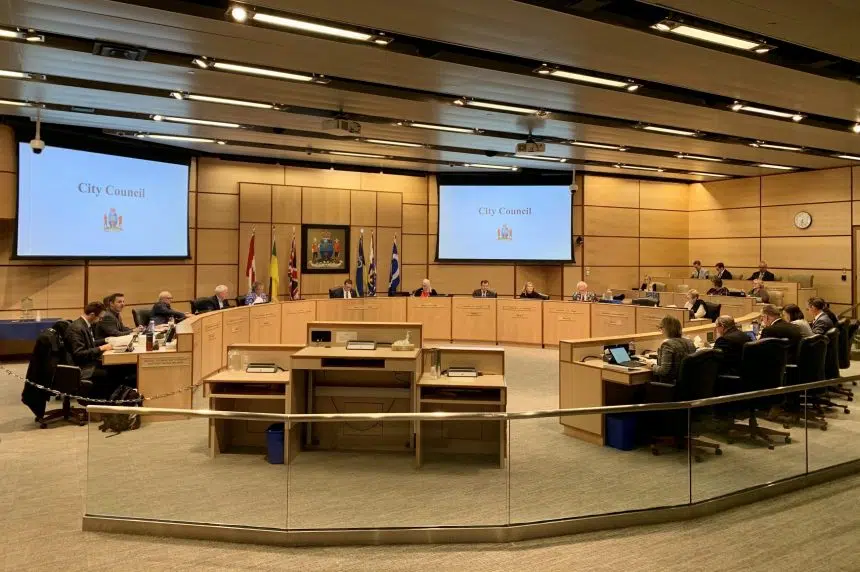For the first time, the City of Regina is putting out a multi-year budget, with proposals for mill rate increases for property taxes and utility rates in both of the next two years.
City administration is proposing a mill rate increase to property taxes of 4.67 per cent in 2023, which would mean on average $8.72 per month more on the average home worth $315,000, and a 4.5 per cent mill rate increase on utilities for $7.32 a month more on the average bill.
In 2024, the proposal is for a 4.66 per cent mill rate increase on property taxes, for a $9.11 increase per month on the average home worth $315,000, and a 4.0 per cent mill rate increase on utilities bills, for a $6.60 increase per month on the average bill.
Close to two per cent of the mill rate increase in both years is due to police operations increases — a $6.3-million increase in 2023, and a $5.6-million increase in 2024.
Barry Lacey, the city’s executive director of Financial Strategy and Sustainability, said the city — just like people and businesses — is facing pressures from inflation.
“As a city, we need to continue to provide a level of service and meet the service levels that the residents of Regina look to us to deliver on. As well, I think there’s opportunities there to make advancements with respect to the city priorities that will benefit and provide the service the residents of Regina are looking for,” said Lacey.
Lacey said the question of affordability is constantly in mind when officials are going through this process.
“We attempt to strike the right balance between delivering on the services the residents of the city want and expect from the city and delivering an affordable budget,” he explained.
Lacey also pointed out that, under the municipal system, city administration’s draft budget goes public and then will go to city council next month for discussion, potential changes and eventual approval.
“There can be that public discussion about whether that right balance has been achieved and whether the budget that is being proposed by administration is one that is striking the right balance,” said Lacey.
The city said it has found cost savings and cost avoidance to the tune of $1 million in 2023 and $1.5 million in 2024 — specifically talking about things like optimizing vehicle requirements and consolidating low-value purchases for better pricing.
Mayor Sandra Masters didn’t seem to like the increases in the proposal, she said she was struggling with how high they were, while at the same time justifying an increase of some kind.
“Citizens are very clear, they don’t want property taxes to go up but they don’t want services to be cut either and so there’s a balance to it,” said Masters.
The mayor said the city managed to come in under the inflation rate and that nearly half of the city’s operating budget is salaries, which go up every year.
“If you’re not building them into the mill rate, I’m actually not sure how we pay for it unless we start cutting jobs, and then you have to cut services,” said Masters.
The mayor talked about how important growth is to a city, that people want the amenities of a big city but they require a larger tax base. She talked about things the city is doing in that regard and more that she wants to see done.
As she has talked about since her campaign to become mayor, Masters also talked about efficiencies in city operations.
“I’m not sure that I would consider the 2023-2024 budgets proposed to be quite aggressive enough in finding efficiencies,” explained Masters.
She said that could mean anything from fuel costs from idling vehicles to allocation of assets — having equipment in the right place at the right time.
Masters said it’ll be an interesting debate in the city council chambers.
“Could we come back at council and say ‘take another point and a half off of it.’ And see then what happens? Yeah, that’s actually a viable option to try and get it down to a number that is just more easily absorbed,” said Masters.
Though the mayor also said that a zero per cent increase would be problematic in and of itself.
“What ends up happening is capital projects get abandoned and then we’re just in a situation where we have a billion dollar infrastructure deficit and over half a billion of it is unfunded – there’s no funding plan for it in the next ten years,” she said.
The proposed budget will go to city council Dec. 14 at 9 a.m., with a possibility of discussion continuing into the next two days if needed. Residents are invited to talk to their councillors or submit a delegation for the meeting.
The details
In the proposed budget released Tuesday, the city broke down spending in each area.
Police spending is proposed to go up to $110 million in 2023 and $115.6 million in 2024, up from $103.7 million this year.
Money for roads is down to $44.4 million for 2023, and down again to $43.3 million in 2024, from the $45 million budgeted in 2022.
Spending on parks, recreation and culture is proposed to drop slightly to $54.7 million and then rise just a bit to $54.8 million in 2024. It was $55.5 million this year.
Money for transit and fleet is budgeted to rise to $37.5 million in 2023 and $38.1 million in 2024, up from $36.8 million in 2022.
Spending on fire services is expected to rise to $44.6 million in 2023 and $45.5 million in 2024. It was $44.4 million this year.
Garbage and recycling is projected to stay basically steady at about $25 million in 2023 and 2024.
And the heading “community investments” is budgeted to rise to $17.9 million in 2023 and to $18.2 million in 2024, from $14.3 million in 2022.
There’s $1.7 million put aside for Community and Social Impact Regina funding, and $258,000 in annual funding for the Adapted Recreation Plan including improvements to facility accessibility.
When it comes to the city’s interest in net-zero and environmental sustainability, there is $20.6 million in this budget to upgrade facilities and support the electrification of city buses and $2.2 million for facility upgrades around the Renewable Regina goals.
The proposed budget also includes: $6 million in 2023 for rail line development in the city, including the future Ring Road rail relocation; $13.5 million in 2023 for improvements along Saskatchewan Drive, 11th Avenue, Dewdney Avenue and Scarth Street; $1.5 million for light-duty vehicle charging stations; and, $8.6 million for the future Indoor Aquatic Facility and $3 million for pickleball courts.
The five-year capital plan is also up for approval, with a proposed $741 million to be spent between 2023 and 2027 — including $157 million in 2023.











